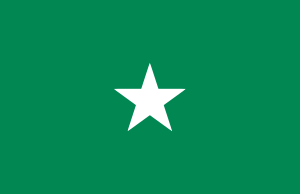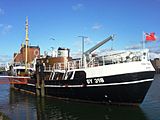Ross Group facts for kids
| Private | |
| Industry | Fish processing |
| Founded | 1920 |
| Founder | Thomas Ross |
| Headquarters | Grimsby |
|
Area served
|
UK |
| Products | Fish products |
The Ross Group was a British food company that started in Grimsby, England, in 1920. It began as a small family business selling fish. Over time, it grew into a huge company.
The Ross Group became famous for catching, processing, and selling fish. They also expanded into other foods, like chicken. At one point, they were the biggest chicken producer in Europe! Today, the "Ross" brand is still well-known for frozen fish in stores.
The company's story is closely linked to the history of Grimsby, a town famous for its fishing industry.
Contents
The History of Ross Group
How It Started
The company was officially named Thomas Ross Ltd in 1920. It was founded in Grimsby, a major fishing port. In 1929, Carl Ross, the founder's son, took charge of the company.
Before World War II began, Thomas Ross Ltd had offices in Leeds, Leicester, and Fleetwood. These were in addition to their main base in Grimsby.
Catching Fish with Trawlers
The Ross Group started with just four fishing boats in the 1930s. They began to focus on trawling (a method of fishing using a large net) in 1934. They bought shares in other fishing companies, like Trawlers Grimsby in 1944.
In 1956, Carl Ross took over GF Sleight Ltd. This company had some of the best trawler captains in Britain. Ross Group also started building their own fishing boats. They built famous 'Cat' and 'Bird' class trawlers. By 1960, the Ross Group owned the largest fishing fleet in Europe. They had 65 vessels by the mid-1960s, making them the second-largest fleet in England.
Famous Ross Fishing Ships
Many ships were part of the Ross fleet. Some of the most well-known include:
- Ross Tiger (launched in 1957): This was the first 'Cat Class' ship. You can still see it today at the National Fishing Heritage Centre in Grimsby.
- Ross Leopard (launched in 1957): This ship was later docked in the Thames River.
- Ross Jaguar (launched in 1957): This ship was changed into a three-masted schooner.
- Ross Kashmir (launched in 1957): This ship later became the Rainbow Warrior II for Greenpeace.
- Ross Revenge (launched in 1960): This ship was later used as a radio ship for Radio Caroline.
- Ross Cleveland: This ship was involved in a sad event called the Hull triple trawler tragedy.
Processing Fish for Everyone
In 1953, the company started importing fish from Iceland. This was a big deal because importing Icelandic fish had been banned. In 1954, they brought in a huge amount of Halibut (150 tonnes). This was enough fish for one million meals!
By the late 1950s, the Ross Group was bringing in 100 million pounds of fish each year. In 1959, the company changed its name to Ross Group. All their food products were then sold under this new name. They even opened a division in the Netherlands in 1965 to sell their products there.
Growing into New Foods
By the early 1960s, the Ross Group had expanded a lot. They now dealt with poultry (like chickens), frozen foods, and fresh foods, not just fish. Even though fishing was how they started, it only made up a small part of their sales by then.
The company also had a factory in Westwick, Norfolk, where they processed fruits and vegetables like peas. They started making potato chips in 1962. They even bought companies that sold chickens and fruit shops.
By the mid-1960s, their biggest businesses were poultry and frozen foods. They were the largest fish distributors in the UK. In 1965, the company was worth £27 million.
A new, tall 11-story headquarters was built in Grimsby in the mid-1960s. This building, called 'Ross House', is still used today by Young's Bluecrest. It stands out in the area where the town's fish docks used to be very busy.
Changes and Takeovers
Carl Ross left the Ross Group in 1965 after some disagreements. Because of this, another company, Imperial Tobacco, took control of the Ross Group in 1969. They offered £47.5 million to buy the company.
While Carl Ross was in charge, the company had started making non-fish frozen foods. These parts of the company were later bought by other businesses. The Ross fishing fleet, however, joined with another company called British United Trawlers in 1969.
By the 1970s, the three biggest frozen food producers in the UK were Birds Eye, Findus, and the Ross Group. Ross Poultry, which made chicken products, was also doing very well.
Finally, in 1988, the entire Ross Group company was bought by United Biscuits for £335 million.
Images for kids
-
The National Fishing Heritage Centre in Grimsby, where you can see the Ross Tiger.
 | Delilah Pierce |
 | Gordon Parks |
 | Augusta Savage |
 | Charles Ethan Porter |




